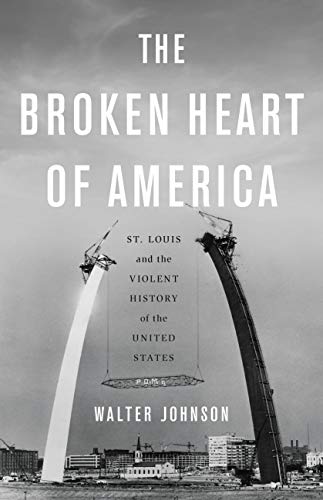
Racial Healing Is Critical to [Economic] Recovery
by Rev. Dr. Starsky Wilson
On April 14, when St. Louis was under shelter-in-place orders due to COVID-19, Walter Johnson, a Missouri native and professor at Harvard University released a new book. Weaving national taproots from the slave trade and Indian Wars through the police killing of Michael Brown, Jr., the text is entitled The Broken Heart of America: St. Louis and the Violent History of the United States. The publication could not have been more timely.
The week before on April 8, St. Louis’ Health Director, Dr. Fredrick Echols, reported that we were rounding out a month-long scourge in which only Black St. Louisans died from the novel coronavirus. His announcement launched earnest interrogation of the pandemic’s disproportionate impact on Black people and social determinants of health.
Two days after the book release, the Department of Commerce announced that the $349 billion small business forgivable loan program, known as the Paycheck Protection Program or PPP, was out of funding. A Goldman Sachs survey of 10,000 businesses from April 20-21, reported that only 40% of Black business owners received PPP funds, compared to 52% of all applicants.
Just after the survey results were in, on April 26, attention was drawn to Brunswick, Georgia when the New York Times reported on months of prosecutorial and police inaction after the killing of Ahmaud Arbery, a Black 25-year old jogger, by a former police officer and his son.
As if this was not difficult enough, the 20 million U.S. jobless claims from the month of April doubled to 40.5 million in May and many of our investment portfolios were returned to December 2018 levels, wiping out 2019 growth.
Perhaps this last point is why – as these symptoms of racial inequity in health, finance and safety were being reported daily and framed historically – many of us with investments, endowment and interest in the stock market were otherwise consumed with “reopening the economy.”
Regrettably, since Memorial Day, towering flames and smoldering embers in cities across America have reminded us that anti-Black racism and its effects are as bad for business as a global pandemic. Dr. Johnson might suggest that truth should be clearer to St. Louis business leaders than anyone.
The video-recorded killing of 46-year old George Floyd by Officer Derek Chauvin in Minneapolis was a triggering reminder of the four hours Michael Brown, Jr. laid in the street in Ferguson. The days of waiting for police to be arrested were reminiscent of the painful moments of then County Prosecutor Bob McCullough’s press conference announcing that he would not bring charges against Officer Darren Wilson. The outpouring of bottled-up frustration from decades of systemic oppression and public lynching which made its way into the streets of America for seven days following was a foregone conclusion. Unfortunately, so was the fact that these massive expressions of civil disobedience would become cover for property damage, violence, and economic destruction extending the financial and health impacts of the global pandemic.
Johnson’s writing is built on the late Cedric Robinson’s framework of ‘racial capitalism.’ The term is defined as “the intertwined history of white supremacist ideology and the practices of empire, extraction and exploitation.” In this moment, it offers clarity that there is an extricable cycle of anti-Black racism, community uprising and economic degradation written into American history. The only way to stop this cycle is to address the root cause directly and deeply. Neither COVID-19, protests, vandalism, nor crime are the cause of the events of the last week. Persistent, systemic racist oppression by way of extrajudicial killing of Black people is.
In recent memory, St. Louis lived the history America is rehearsing right now. Frankly, we are on the brink of reliving it. Even after the President of the United States ordered citizens to be tear gassed at the White House to clear the path for a photo opportunity, on June 2 images of violence in St. Louis led CNN News again.
This time, leaders reading these pages must model better choices. For nearly six years, we have proven that we learned the language of racial equity, but not the lessons. Former St. Louisans and Missourians, like Johnson, are trying to show us the way. Let’s follow.
The path to sustainable economic and social recovery is through racial equity and healing.
Nearly a decade ago, PolicyLink, then led by St. Louis native, Angela Glover Blackwell, joined the University of Southern California using data to champion the message that ‘equity is the superior growth model’ for regional economies and American’s business. In recent weeks, Twitter, led by St. Louisan Jack Dorsey, joined the growing list of corporations and international brands in solidarity with the Black Lives Matter movement. I was heartened that even as I wrote this piece, Deaconess Foundation’s portfolio advisor emailed to let me know the company would make a $1 billion, four-year investment to accelerate their work around racial inequity, economic opportunity and health care initiatives.
It is time for St. Louis business leaders to take a new approach to protecting the bottom line. Align with the values of the rising demographics of our teams, executives, shareholders and consumers by rooting structural racism out of our organizations. Let us listen together to hear these voices and join the struggle against this injustice which is stripping life, health and wealth from our communities.
Also published in the St. Louis Business Journal
Rev. Dr. Starsky Wilson is president & CEO of Deaconess Foundation and board chair for the National Committee for Responsive Philanthropy. He formerly co-chaired the Ferguson Commission. Follow him at @revdrstarsky and @deaconessfound.
